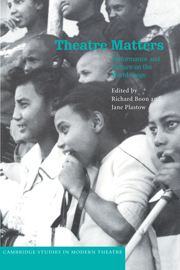Book contents
- Frontmatter
- Contents
- Notes on contributors
- Foreword: A letter from Kingston
- Preface
- Acknowledgements
- 1 Introduction
- 2 ‘The Revolution as Muse’: drama as surreptitious insurrection in a post-colonial, military state
- 3 Making theatre for a change: two plays of the Eritrean liberation struggle
- 4 Race matters in South African theatre
- 5 Dreams of violence: moving beyond colonialism in Canadian and Caribbean drama
- 6 The French-speaking Caribbean: journeying from the native land
- 7 ‘Binglishing’ the stage: a generation of Asian theatre in England
- 8 Popular theatre for the building of social awareness: the Indian experience
- 9 The promise of performance: True Love/Real Love
- 10 Making America or making revolution: the theatre of Ricardo Halac in Argentina
- Index
4 - Race matters in South African theatre
Published online by Cambridge University Press: 25 October 2009
- Frontmatter
- Contents
- Notes on contributors
- Foreword: A letter from Kingston
- Preface
- Acknowledgements
- 1 Introduction
- 2 ‘The Revolution as Muse’: drama as surreptitious insurrection in a post-colonial, military state
- 3 Making theatre for a change: two plays of the Eritrean liberation struggle
- 4 Race matters in South African theatre
- 5 Dreams of violence: moving beyond colonialism in Canadian and Caribbean drama
- 6 The French-speaking Caribbean: journeying from the native land
- 7 ‘Binglishing’ the stage: a generation of Asian theatre in England
- 8 Popular theatre for the building of social awareness: the Indian experience
- 9 The promise of performance: True Love/Real Love
- 10 Making America or making revolution: the theatre of Ricardo Halac in Argentina
- Index
Summary
I am Black / Black like my mother / Black like the sufferers / Black like the continent.
(Mthuli ka Shezi, Shanti, 1972)We all know that we are fragments / of a common segment / Cemented by the blood of a common struggle / We are a people with a common destination / We are the children of Shaka.
(Matsemela Manaka, Pula, 1982)… the ‘black man good, white man bad’ syndrome is as dated in our theatre as last month's fish and chip wrappings.
(Raeford Daniel, 1992)My strength is with black people … if you have the numbers you have the power.
(Mbongeni Ngema, 1996)Race and nation in the theatre
Since 1976 a great deal of published opinion about South African theatre has drawn attention to the themes of racial discrimination and African nationalism. In debating these themes, theatre scholars and critics have neglected other themes as well as important developments in the forms and styles of performance which have emerged in the last quarter of the century. But there is an area of that debate which, it seems to me, can be enriched by yet further discussion, especially at a time when the euphoric response to South Africa's political miracle has begun to be replaced by more pragmatic debate about sustaining political transformation.
The history of the struggle for liberation from apartheid reflects an historical tension between at least two broad fronts: between on the one hand a majority non-racial tradition, and on the other a range of racially focused separatist traditions which, for convenience, can be described here as Africanist.
- Type
- Chapter
- Information
- Theatre MattersPerformance and Culture on the World Stage, pp. 55 - 75Publisher: Cambridge University PressPrint publication year: 1998
- 1
- Cited by



